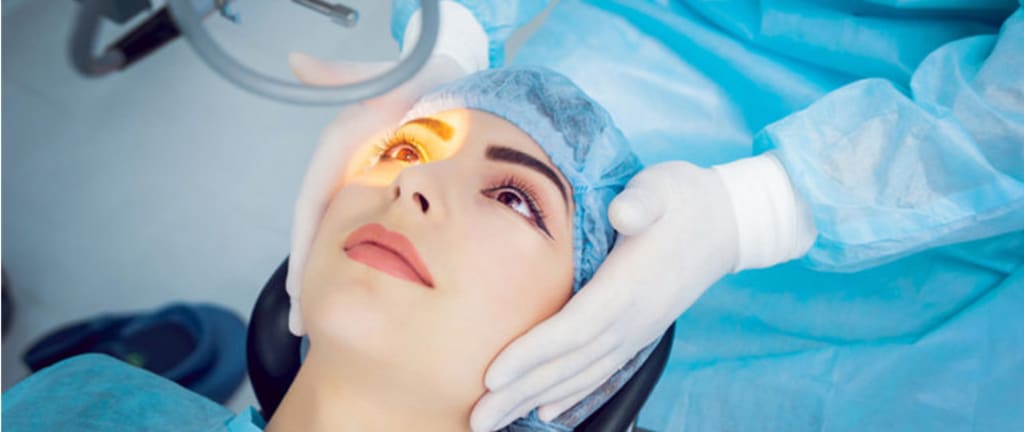Is Laser Eye Surgery Considered Safe?
This is the most common question asked by patients planning laser eye surgery. Eye surgery can be difficult because vision is so important. Laser eye surgery is safe and optional, so you can rest assured.

Is laser eye surgery considered safe?
This is the most common question asked by patients planning laser eye surgery. Eye surgery can be difficult because vision is so important. Laser eye surgery is safe and optional, so you can rest assured. Various forms of laser eye surgery have been practiced for over 30 years and have proven themselves very well. LASIK, ASLA, and SMILE have been extensively studied over the years and there is a wealth of clinical evidence showing that all vision correction procedures are safe and effective in those who qualify.
LASIK surgery is an option to correct one of the following vision problems:
- Nearsightedness (myopia).If the eyeball is slightly longer than normal, or if the cornea curves too sharply, the light rays are focused in front of the retina, blurring the distance. You can see close objects very clearly, but not distant objects.
- Farsightedness (hyperopia). If the eyeball is smaller than average or the cornea is too flat, the light is focused behind the retina rather than the retina. This results in blurred vision near and sometimes far.
- Astigmatism occurs when the cornea is unevenly curved or flat, which interferes with focusing near and far.
Lasik can often improve vision without wearing glasses or contact lenses. Overall, it is very likely that your vision will improve by at least 20/25 after refractive surgery.
More than 8 in 10 people who have refractive LASIK surgery no longer need glasses or contact lenses for most activities.
results will depend on specific refractive errors and other factors. Refractive surgery is usually best for people with low myopia. People who have a high degree of nearsightedness or farsightedness along with astigmatism have fewer predictable outcomes.
Millions of people have had LASIK. This is because LASIK is the most performed laser eye surgery. Thousands of studies have been conducted on the safety of LASIK and how well it can correct refractive errors (myopia, farsightedness, astigmatism, etc.). A 2016 review article selected and analyzed 97 most recent LASIK studies, including 67,893 LASIK-treated eyes and LASIK surgeries, to understand their outcomes globally. They had good results in more than 90% of patients (vision 20/20 and nearly 100% visual acuity 6/6). Most of the problems that can occur after laser vision correction surgery are resolved in a short period of time. However, it is important to fully understand the potential risks before surgery. This includes:
- Refractive error or lack of correction: means your vision is not perfect after surgery. In almost all cases, it can be corrected with an "enlargement" procedure (wearing glasses or contact lenses).
- Vision loss: A small number of people may experience this when their vision stabilizes after surgery, but it usually resolves within 6 months.
- Dry Eye: Laser eye surgery destroys the tear film in the eye, preventing tear formation and can cause dry eye. This is normal for weeks or months after surgery but rarely persists.
- Flap issues: If the patient rubs their eyes too early, swims, or plays sports, the corneal flap that is lifted and replaced during LASIK may fall off post-operatively. This can be avoided by following the guidelines for recovery after surgery.
Serious complications are rare. Many people think that lasers themselves can cause blindness, but in reality, an eye infection received during or after surgery can sometimes cause visual impairment (without treatment). That's why it's so important to choose a laser ophthalmologist you can trust. This greatly reduces the chances of serious complications. Laser eye surgery is safe and effective for people who are eligible for this procedure. If the eye is not suitable for surgery, the outcome is less and the risk of complications after surgery is increased. The experienced eye specialists are trained to perform a comprehensive assessment to understand everything about your eye, from the thickness and shape of your cornea to the overall condition of your eye, and advise which procedure is best for your eye and which procedure should be right for your laser. If you have been told that you are not suitable for laser eye surgery, take this recommendation seriously. Advances in laser eye surgery have made this procedure available to more patients, but it is not recommended for everyone. In most cases, laser eye surgery is not recommended unless,
- You are under the age of 18.
- People who have severe hyperopia or astigmatism.
- Lens prescription is unstable or constantly changing (lens prescription must be constant for 1 year before surgery).
- Corneal disorders or thin corneal conditions, such as keratoconus.
- Eye damage or eye infection.
- Eye conditions including amblyopia/lazy eye or strabismus/strabismus.
- Pregnant or breastfeeding.






Comments
There are no comments for this story
Be the first to respond and start the conversation.